Analysing Organisational Behaviour: A Case Study of TESCO plc
VerifiedAdded on 2023/01/19
|17
|6228
|60
Report
AI Summary
This report provides a comprehensive analysis of organisational behaviour within TESCO plc. It begins by examining the impact of culture, politics, and power on individual employee behaviour and performance, utilising Handy's and Hofstede's models of culture to understand employee dynamics. The report then delves into content and process theories of motivation, exploring their application within the organisation. The analysis extends to the factors that contribute to both effective and ineffective teams. Finally, the report discusses the philosophies and concepts of organisational behaviour, offering insights into how TESCO can manage its workforce. The report covers reward power, coercive power, legitimate power, referent power, informational power and expert power. The conclusion summarizes the key findings and offers recommendations for fostering a positive and productive work environment at TESCO. References are included to support the research and analysis.
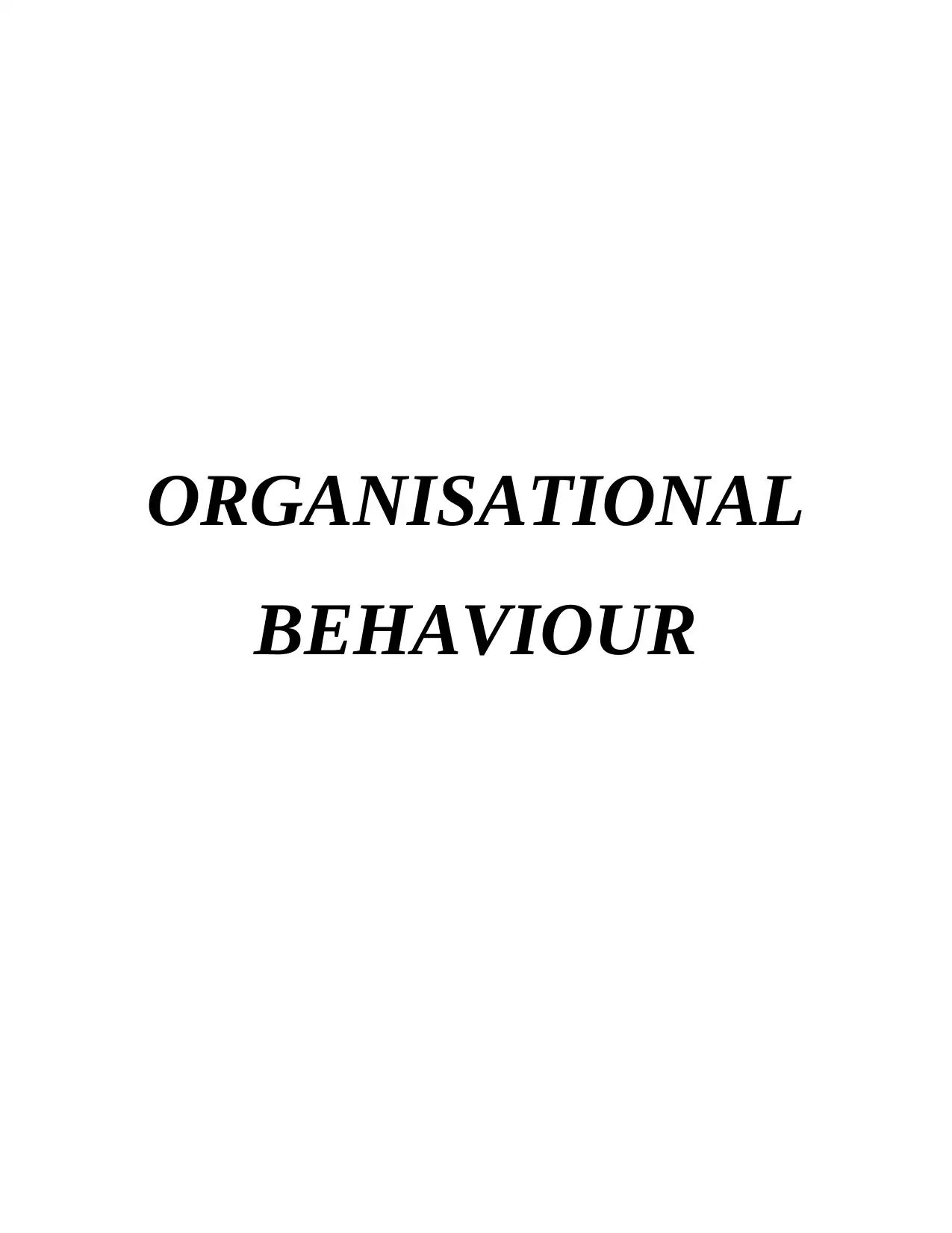
ORGANISATIONAL
BEHAVIOUR
BEHAVIOUR
Paraphrase This Document
Need a fresh take? Get an instant paraphrase of this document with our AI Paraphraser
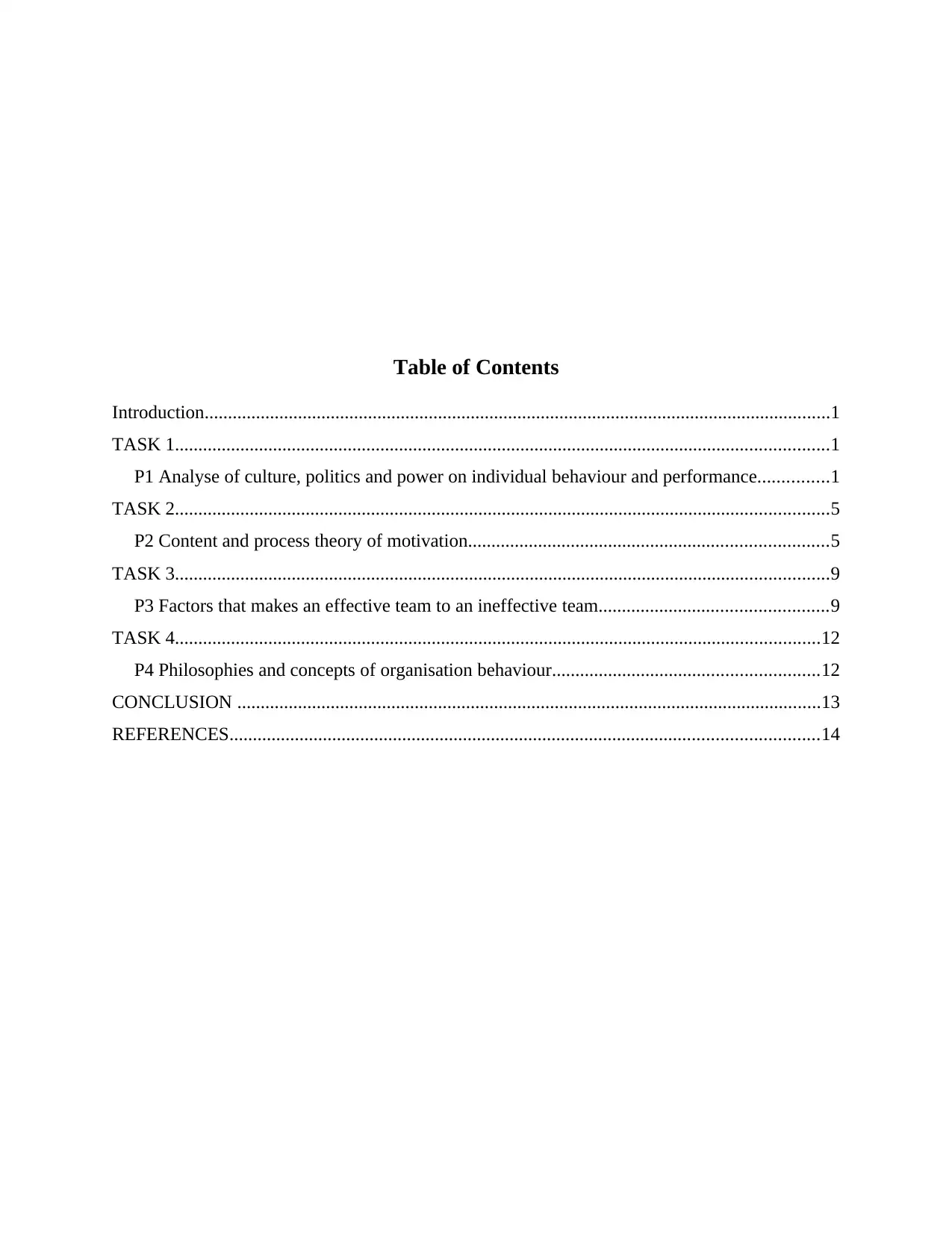
Table of Contents
Introduction......................................................................................................................................1
TASK 1............................................................................................................................................1
P1 Analyse of culture, politics and power on individual behaviour and performance...............1
TASK 2............................................................................................................................................5
P2 Content and process theory of motivation.............................................................................5
TASK 3............................................................................................................................................9
P3 Factors that makes an effective team to an ineffective team.................................................9
TASK 4..........................................................................................................................................12
P4 Philosophies and concepts of organisation behaviour.........................................................12
CONCLUSION .............................................................................................................................13
REFERENCES..............................................................................................................................14
Introduction......................................................................................................................................1
TASK 1............................................................................................................................................1
P1 Analyse of culture, politics and power on individual behaviour and performance...............1
TASK 2............................................................................................................................................5
P2 Content and process theory of motivation.............................................................................5
TASK 3............................................................................................................................................9
P3 Factors that makes an effective team to an ineffective team.................................................9
TASK 4..........................................................................................................................................12
P4 Philosophies and concepts of organisation behaviour.........................................................12
CONCLUSION .............................................................................................................................13
REFERENCES..............................................................................................................................14
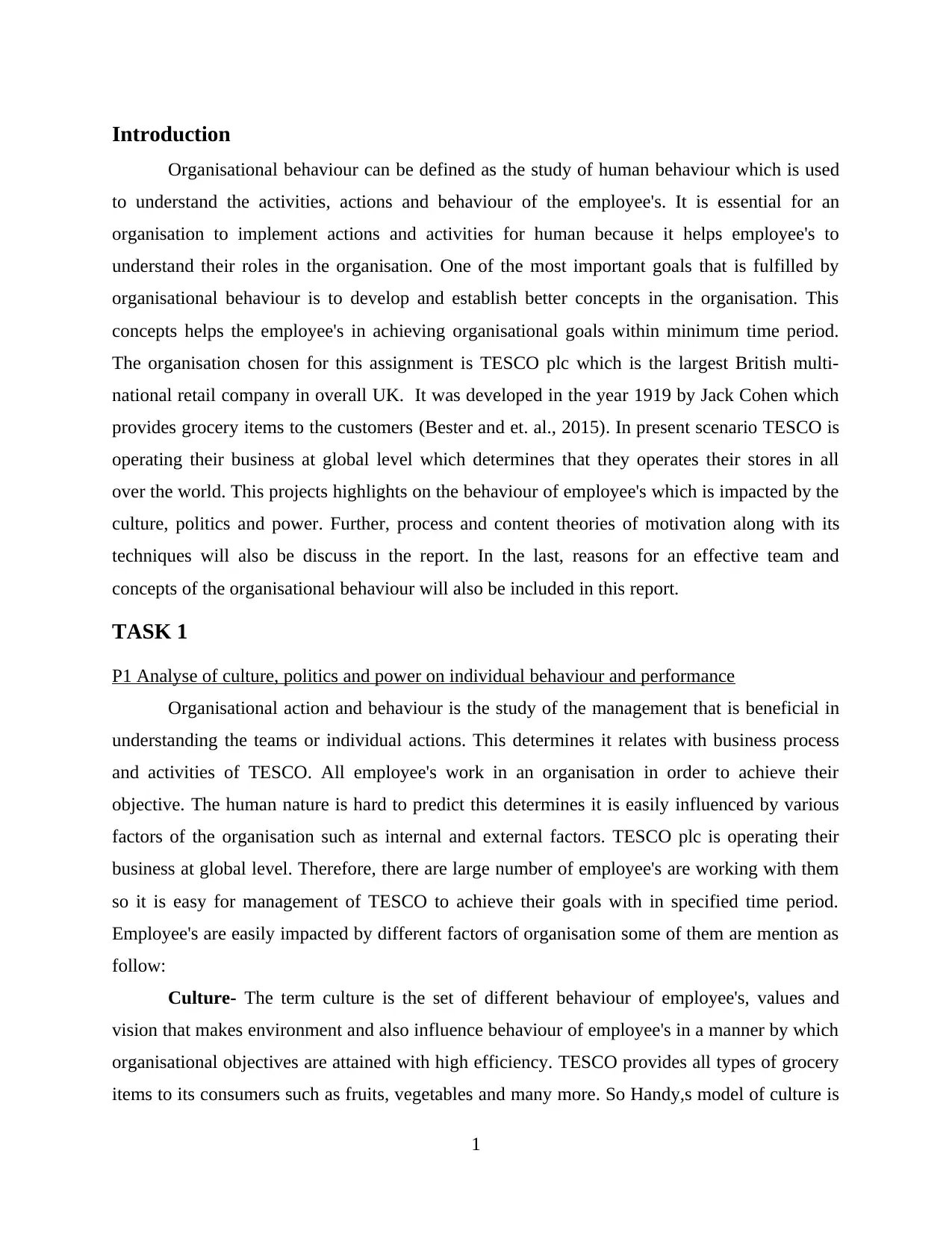
Introduction
Organisational behaviour can be defined as the study of human behaviour which is used
to understand the activities, actions and behaviour of the employee's. It is essential for an
organisation to implement actions and activities for human because it helps employee's to
understand their roles in the organisation. One of the most important goals that is fulfilled by
organisational behaviour is to develop and establish better concepts in the organisation. This
concepts helps the employee's in achieving organisational goals within minimum time period.
The organisation chosen for this assignment is TESCO plc which is the largest British multi-
national retail company in overall UK. It was developed in the year 1919 by Jack Cohen which
provides grocery items to the customers (Bester and et. al., 2015). In present scenario TESCO is
operating their business at global level which determines that they operates their stores in all
over the world. This projects highlights on the behaviour of employee's which is impacted by the
culture, politics and power. Further, process and content theories of motivation along with its
techniques will also be discuss in the report. In the last, reasons for an effective team and
concepts of the organisational behaviour will also be included in this report.
TASK 1
P1 Analyse of culture, politics and power on individual behaviour and performance
Organisational action and behaviour is the study of the management that is beneficial in
understanding the teams or individual actions. This determines it relates with business process
and activities of TESCO. All employee's work in an organisation in order to achieve their
objective. The human nature is hard to predict this determines it is easily influenced by various
factors of the organisation such as internal and external factors. TESCO plc is operating their
business at global level. Therefore, there are large number of employee's are working with them
so it is easy for management of TESCO to achieve their goals with in specified time period.
Employee's are easily impacted by different factors of organisation some of them are mention as
follow:
Culture- The term culture is the set of different behaviour of employee's, values and
vision that makes environment and also influence behaviour of employee's in a manner by which
organisational objectives are attained with high efficiency. TESCO provides all types of grocery
items to its consumers such as fruits, vegetables and many more. So Handy,s model of culture is
1
Organisational behaviour can be defined as the study of human behaviour which is used
to understand the activities, actions and behaviour of the employee's. It is essential for an
organisation to implement actions and activities for human because it helps employee's to
understand their roles in the organisation. One of the most important goals that is fulfilled by
organisational behaviour is to develop and establish better concepts in the organisation. This
concepts helps the employee's in achieving organisational goals within minimum time period.
The organisation chosen for this assignment is TESCO plc which is the largest British multi-
national retail company in overall UK. It was developed in the year 1919 by Jack Cohen which
provides grocery items to the customers (Bester and et. al., 2015). In present scenario TESCO is
operating their business at global level which determines that they operates their stores in all
over the world. This projects highlights on the behaviour of employee's which is impacted by the
culture, politics and power. Further, process and content theories of motivation along with its
techniques will also be discuss in the report. In the last, reasons for an effective team and
concepts of the organisational behaviour will also be included in this report.
TASK 1
P1 Analyse of culture, politics and power on individual behaviour and performance
Organisational action and behaviour is the study of the management that is beneficial in
understanding the teams or individual actions. This determines it relates with business process
and activities of TESCO. All employee's work in an organisation in order to achieve their
objective. The human nature is hard to predict this determines it is easily influenced by various
factors of the organisation such as internal and external factors. TESCO plc is operating their
business at global level. Therefore, there are large number of employee's are working with them
so it is easy for management of TESCO to achieve their goals with in specified time period.
Employee's are easily impacted by different factors of organisation some of them are mention as
follow:
Culture- The term culture is the set of different behaviour of employee's, values and
vision that makes environment and also influence behaviour of employee's in a manner by which
organisational objectives are attained with high efficiency. TESCO provides all types of grocery
items to its consumers such as fruits, vegetables and many more. So Handy,s model of culture is
1
⊘ This is a preview!⊘
Do you want full access?
Subscribe today to unlock all pages.

Trusted by 1+ million students worldwide
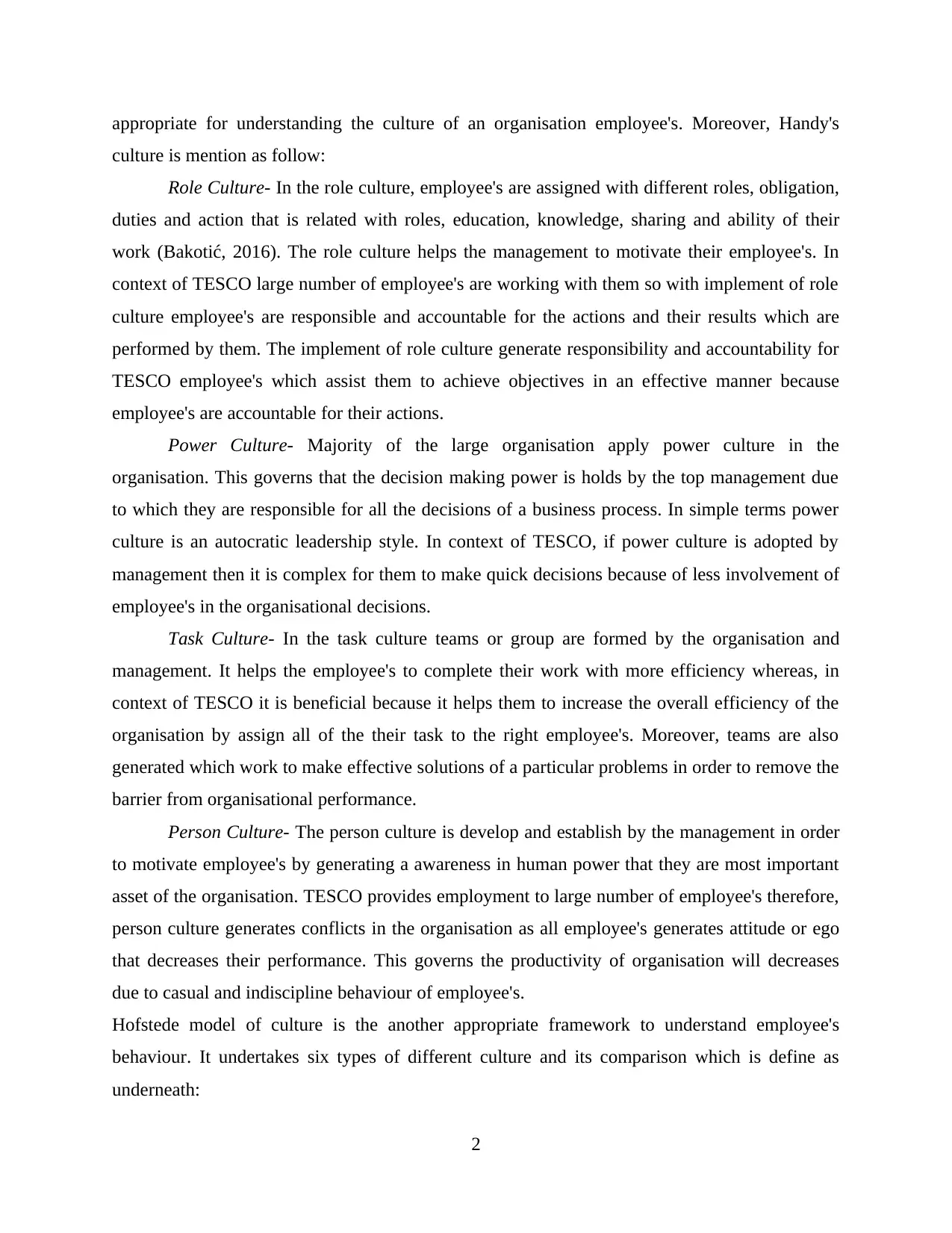
appropriate for understanding the culture of an organisation employee's. Moreover, Handy's
culture is mention as follow:
Role Culture- In the role culture, employee's are assigned with different roles, obligation,
duties and action that is related with roles, education, knowledge, sharing and ability of their
work (Bakotić, 2016). The role culture helps the management to motivate their employee's. In
context of TESCO large number of employee's are working with them so with implement of role
culture employee's are responsible and accountable for the actions and their results which are
performed by them. The implement of role culture generate responsibility and accountability for
TESCO employee's which assist them to achieve objectives in an effective manner because
employee's are accountable for their actions.
Power Culture- Majority of the large organisation apply power culture in the
organisation. This governs that the decision making power is holds by the top management due
to which they are responsible for all the decisions of a business process. In simple terms power
culture is an autocratic leadership style. In context of TESCO, if power culture is adopted by
management then it is complex for them to make quick decisions because of less involvement of
employee's in the organisational decisions.
Task Culture- In the task culture teams or group are formed by the organisation and
management. It helps the employee's to complete their work with more efficiency whereas, in
context of TESCO it is beneficial because it helps them to increase the overall efficiency of the
organisation by assign all of the their task to the right employee's. Moreover, teams are also
generated which work to make effective solutions of a particular problems in order to remove the
barrier from organisational performance.
Person Culture- The person culture is develop and establish by the management in order
to motivate employee's by generating a awareness in human power that they are most important
asset of the organisation. TESCO provides employment to large number of employee's therefore,
person culture generates conflicts in the organisation as all employee's generates attitude or ego
that decreases their performance. This governs the productivity of organisation will decreases
due to casual and indiscipline behaviour of employee's.
Hofstede model of culture is the another appropriate framework to understand employee's
behaviour. It undertakes six types of different culture and its comparison which is define as
underneath:
2
culture is mention as follow:
Role Culture- In the role culture, employee's are assigned with different roles, obligation,
duties and action that is related with roles, education, knowledge, sharing and ability of their
work (Bakotić, 2016). The role culture helps the management to motivate their employee's. In
context of TESCO large number of employee's are working with them so with implement of role
culture employee's are responsible and accountable for the actions and their results which are
performed by them. The implement of role culture generate responsibility and accountability for
TESCO employee's which assist them to achieve objectives in an effective manner because
employee's are accountable for their actions.
Power Culture- Majority of the large organisation apply power culture in the
organisation. This governs that the decision making power is holds by the top management due
to which they are responsible for all the decisions of a business process. In simple terms power
culture is an autocratic leadership style. In context of TESCO, if power culture is adopted by
management then it is complex for them to make quick decisions because of less involvement of
employee's in the organisational decisions.
Task Culture- In the task culture teams or group are formed by the organisation and
management. It helps the employee's to complete their work with more efficiency whereas, in
context of TESCO it is beneficial because it helps them to increase the overall efficiency of the
organisation by assign all of the their task to the right employee's. Moreover, teams are also
generated which work to make effective solutions of a particular problems in order to remove the
barrier from organisational performance.
Person Culture- The person culture is develop and establish by the management in order
to motivate employee's by generating a awareness in human power that they are most important
asset of the organisation. TESCO provides employment to large number of employee's therefore,
person culture generates conflicts in the organisation as all employee's generates attitude or ego
that decreases their performance. This governs the productivity of organisation will decreases
due to casual and indiscipline behaviour of employee's.
Hofstede model of culture is the another appropriate framework to understand employee's
behaviour. It undertakes six types of different culture and its comparison which is define as
underneath:
2
Paraphrase This Document
Need a fresh take? Get an instant paraphrase of this document with our AI Paraphraser
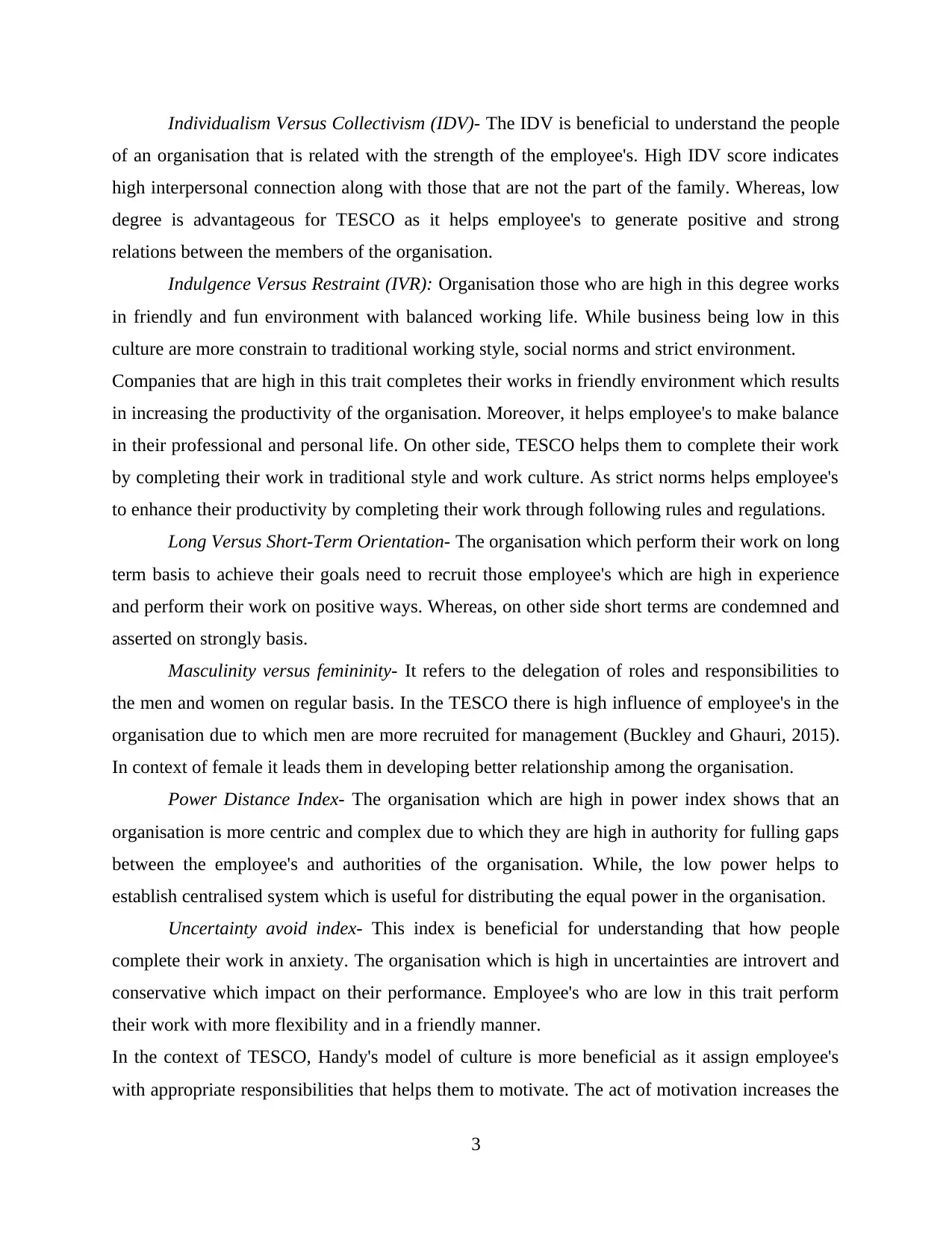
Individualism Versus Collectivism (IDV)- The IDV is beneficial to understand the people
of an organisation that is related with the strength of the employee's. High IDV score indicates
high interpersonal connection along with those that are not the part of the family. Whereas, low
degree is advantageous for TESCO as it helps employee's to generate positive and strong
relations between the members of the organisation.
Indulgence Versus Restraint (IVR): Organisation those who are high in this degree works
in friendly and fun environment with balanced working life. While business being low in this
culture are more constrain to traditional working style, social norms and strict environment.
Companies that are high in this trait completes their works in friendly environment which results
in increasing the productivity of the organisation. Moreover, it helps employee's to make balance
in their professional and personal life. On other side, TESCO helps them to complete their work
by completing their work in traditional style and work culture. As strict norms helps employee's
to enhance their productivity by completing their work through following rules and regulations.
Long Versus Short-Term Orientation- The organisation which perform their work on long
term basis to achieve their goals need to recruit those employee's which are high in experience
and perform their work on positive ways. Whereas, on other side short terms are condemned and
asserted on strongly basis.
Masculinity versus femininity- It refers to the delegation of roles and responsibilities to
the men and women on regular basis. In the TESCO there is high influence of employee's in the
organisation due to which men are more recruited for management (Buckley and Ghauri, 2015).
In context of female it leads them in developing better relationship among the organisation.
Power Distance Index- The organisation which are high in power index shows that an
organisation is more centric and complex due to which they are high in authority for fulling gaps
between the employee's and authorities of the organisation. While, the low power helps to
establish centralised system which is useful for distributing the equal power in the organisation.
Uncertainty avoid index- This index is beneficial for understanding that how people
complete their work in anxiety. The organisation which is high in uncertainties are introvert and
conservative which impact on their performance. Employee's who are low in this trait perform
their work with more flexibility and in a friendly manner.
In the context of TESCO, Handy's model of culture is more beneficial as it assign employee's
with appropriate responsibilities that helps them to motivate. The act of motivation increases the
3
of an organisation that is related with the strength of the employee's. High IDV score indicates
high interpersonal connection along with those that are not the part of the family. Whereas, low
degree is advantageous for TESCO as it helps employee's to generate positive and strong
relations between the members of the organisation.
Indulgence Versus Restraint (IVR): Organisation those who are high in this degree works
in friendly and fun environment with balanced working life. While business being low in this
culture are more constrain to traditional working style, social norms and strict environment.
Companies that are high in this trait completes their works in friendly environment which results
in increasing the productivity of the organisation. Moreover, it helps employee's to make balance
in their professional and personal life. On other side, TESCO helps them to complete their work
by completing their work in traditional style and work culture. As strict norms helps employee's
to enhance their productivity by completing their work through following rules and regulations.
Long Versus Short-Term Orientation- The organisation which perform their work on long
term basis to achieve their goals need to recruit those employee's which are high in experience
and perform their work on positive ways. Whereas, on other side short terms are condemned and
asserted on strongly basis.
Masculinity versus femininity- It refers to the delegation of roles and responsibilities to
the men and women on regular basis. In the TESCO there is high influence of employee's in the
organisation due to which men are more recruited for management (Buckley and Ghauri, 2015).
In context of female it leads them in developing better relationship among the organisation.
Power Distance Index- The organisation which are high in power index shows that an
organisation is more centric and complex due to which they are high in authority for fulling gaps
between the employee's and authorities of the organisation. While, the low power helps to
establish centralised system which is useful for distributing the equal power in the organisation.
Uncertainty avoid index- This index is beneficial for understanding that how people
complete their work in anxiety. The organisation which is high in uncertainties are introvert and
conservative which impact on their performance. Employee's who are low in this trait perform
their work with more flexibility and in a friendly manner.
In the context of TESCO, Handy's model of culture is more beneficial as it assign employee's
with appropriate responsibilities that helps them to motivate. The act of motivation increases the
3
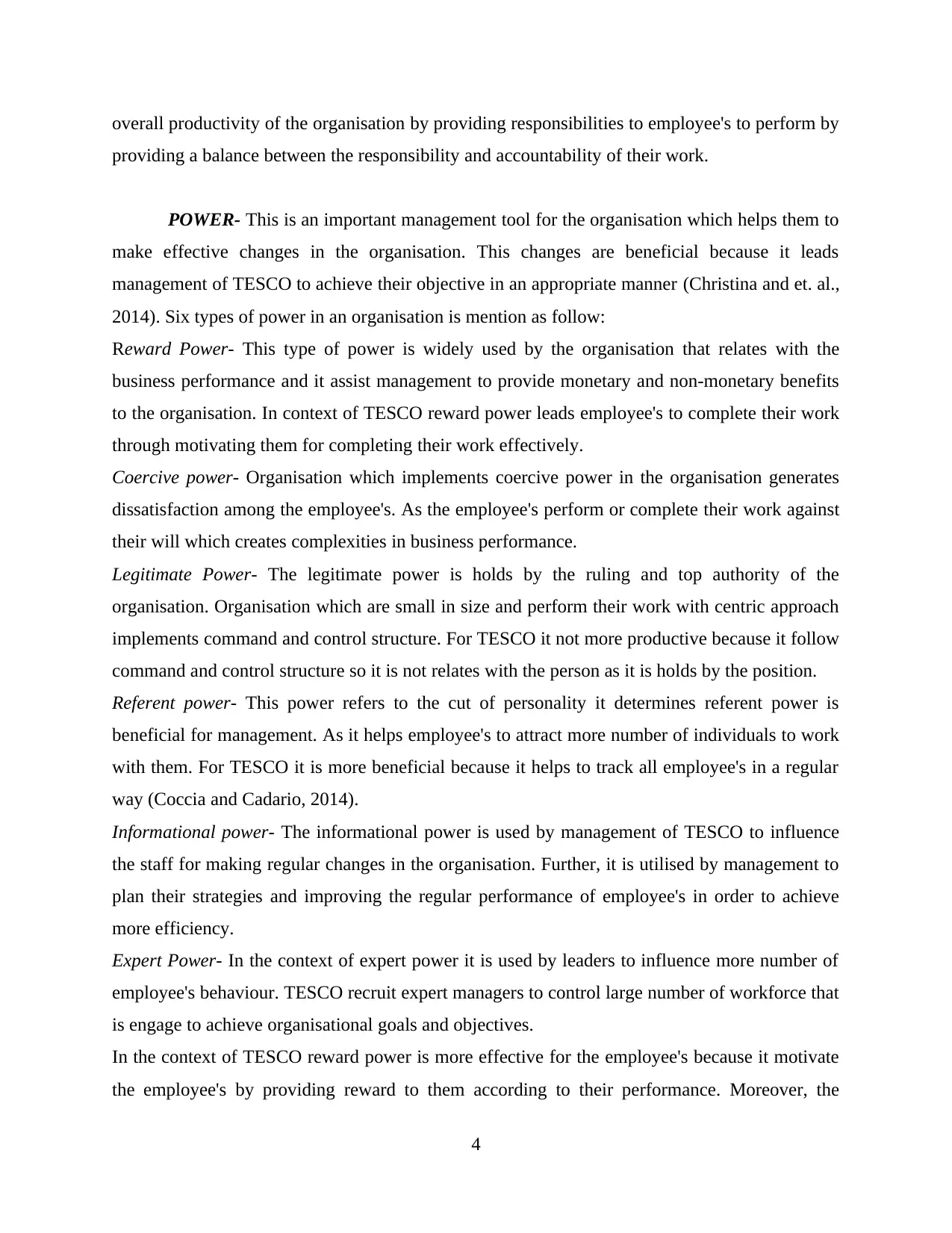
overall productivity of the organisation by providing responsibilities to employee's to perform by
providing a balance between the responsibility and accountability of their work.
POWER- This is an important management tool for the organisation which helps them to
make effective changes in the organisation. This changes are beneficial because it leads
management of TESCO to achieve their objective in an appropriate manner (Christina and et. al.,
2014). Six types of power in an organisation is mention as follow:
Reward Power- This type of power is widely used by the organisation that relates with the
business performance and it assist management to provide monetary and non-monetary benefits
to the organisation. In context of TESCO reward power leads employee's to complete their work
through motivating them for completing their work effectively.
Coercive power- Organisation which implements coercive power in the organisation generates
dissatisfaction among the employee's. As the employee's perform or complete their work against
their will which creates complexities in business performance.
Legitimate Power- The legitimate power is holds by the ruling and top authority of the
organisation. Organisation which are small in size and perform their work with centric approach
implements command and control structure. For TESCO it not more productive because it follow
command and control structure so it is not relates with the person as it is holds by the position.
Referent power- This power refers to the cut of personality it determines referent power is
beneficial for management. As it helps employee's to attract more number of individuals to work
with them. For TESCO it is more beneficial because it helps to track all employee's in a regular
way (Coccia and Cadario, 2014).
Informational power- The informational power is used by management of TESCO to influence
the staff for making regular changes in the organisation. Further, it is utilised by management to
plan their strategies and improving the regular performance of employee's in order to achieve
more efficiency.
Expert Power- In the context of expert power it is used by leaders to influence more number of
employee's behaviour. TESCO recruit expert managers to control large number of workforce that
is engage to achieve organisational goals and objectives.
In the context of TESCO reward power is more effective for the employee's because it motivate
the employee's by providing reward to them according to their performance. Moreover, the
4
providing a balance between the responsibility and accountability of their work.
POWER- This is an important management tool for the organisation which helps them to
make effective changes in the organisation. This changes are beneficial because it leads
management of TESCO to achieve their objective in an appropriate manner (Christina and et. al.,
2014). Six types of power in an organisation is mention as follow:
Reward Power- This type of power is widely used by the organisation that relates with the
business performance and it assist management to provide monetary and non-monetary benefits
to the organisation. In context of TESCO reward power leads employee's to complete their work
through motivating them for completing their work effectively.
Coercive power- Organisation which implements coercive power in the organisation generates
dissatisfaction among the employee's. As the employee's perform or complete their work against
their will which creates complexities in business performance.
Legitimate Power- The legitimate power is holds by the ruling and top authority of the
organisation. Organisation which are small in size and perform their work with centric approach
implements command and control structure. For TESCO it not more productive because it follow
command and control structure so it is not relates with the person as it is holds by the position.
Referent power- This power refers to the cut of personality it determines referent power is
beneficial for management. As it helps employee's to attract more number of individuals to work
with them. For TESCO it is more beneficial because it helps to track all employee's in a regular
way (Coccia and Cadario, 2014).
Informational power- The informational power is used by management of TESCO to influence
the staff for making regular changes in the organisation. Further, it is utilised by management to
plan their strategies and improving the regular performance of employee's in order to achieve
more efficiency.
Expert Power- In the context of expert power it is used by leaders to influence more number of
employee's behaviour. TESCO recruit expert managers to control large number of workforce that
is engage to achieve organisational goals and objectives.
In the context of TESCO reward power is more effective for the employee's because it motivate
the employee's by providing reward to them according to their performance. Moreover, the
4
⊘ This is a preview!⊘
Do you want full access?
Subscribe today to unlock all pages.

Trusted by 1+ million students worldwide
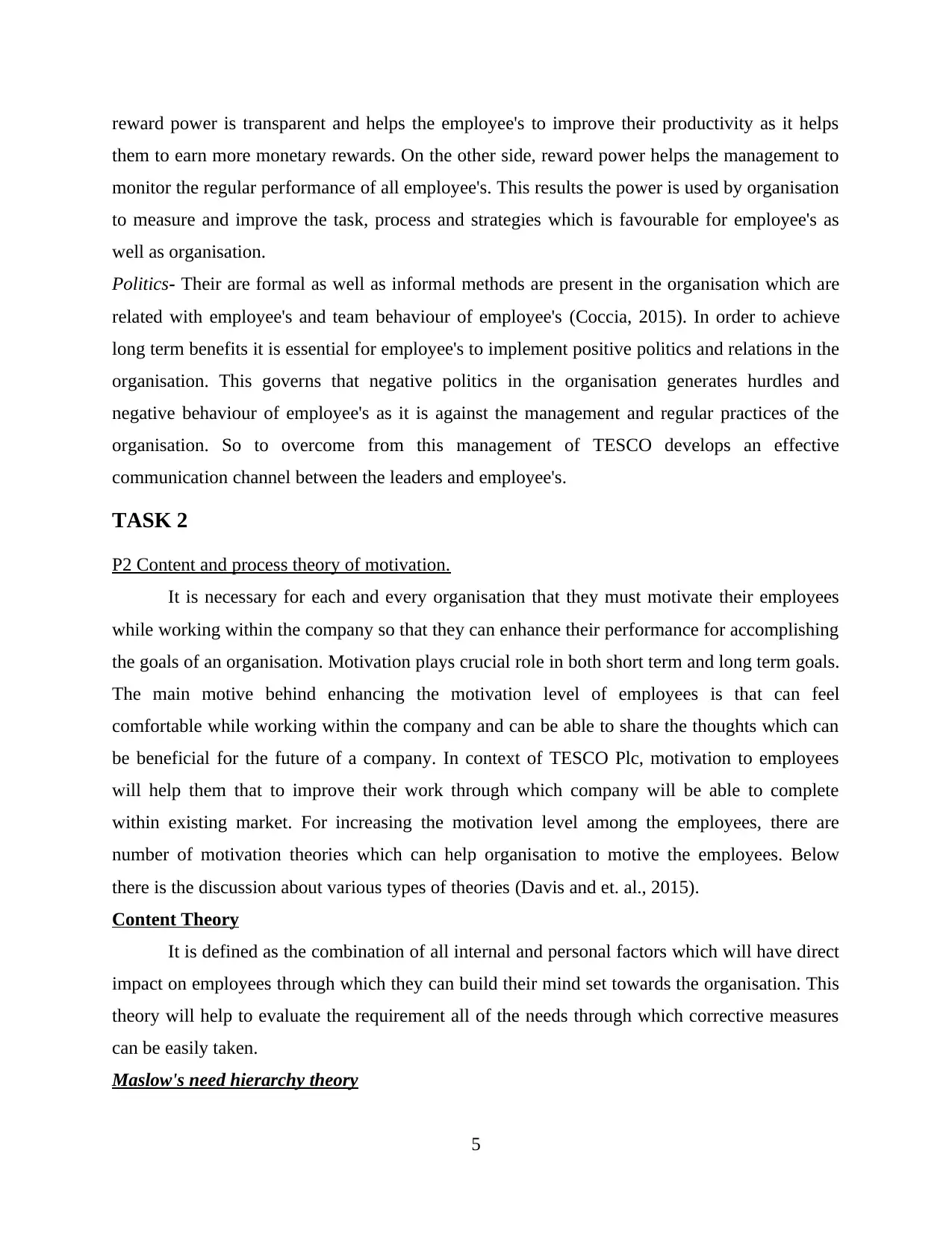
reward power is transparent and helps the employee's to improve their productivity as it helps
them to earn more monetary rewards. On the other side, reward power helps the management to
monitor the regular performance of all employee's. This results the power is used by organisation
to measure and improve the task, process and strategies which is favourable for employee's as
well as organisation.
Politics- Their are formal as well as informal methods are present in the organisation which are
related with employee's and team behaviour of employee's (Coccia, 2015). In order to achieve
long term benefits it is essential for employee's to implement positive politics and relations in the
organisation. This governs that negative politics in the organisation generates hurdles and
negative behaviour of employee's as it is against the management and regular practices of the
organisation. So to overcome from this management of TESCO develops an effective
communication channel between the leaders and employee's.
TASK 2
P2 Content and process theory of motivation.
It is necessary for each and every organisation that they must motivate their employees
while working within the company so that they can enhance their performance for accomplishing
the goals of an organisation. Motivation plays crucial role in both short term and long term goals.
The main motive behind enhancing the motivation level of employees is that can feel
comfortable while working within the company and can be able to share the thoughts which can
be beneficial for the future of a company. In context of TESCO Plc, motivation to employees
will help them that to improve their work through which company will be able to complete
within existing market. For increasing the motivation level among the employees, there are
number of motivation theories which can help organisation to motive the employees. Below
there is the discussion about various types of theories (Davis and et. al., 2015).
Content Theory
It is defined as the combination of all internal and personal factors which will have direct
impact on employees through which they can build their mind set towards the organisation. This
theory will help to evaluate the requirement all of the needs through which corrective measures
can be easily taken.
Maslow's need hierarchy theory
5
them to earn more monetary rewards. On the other side, reward power helps the management to
monitor the regular performance of all employee's. This results the power is used by organisation
to measure and improve the task, process and strategies which is favourable for employee's as
well as organisation.
Politics- Their are formal as well as informal methods are present in the organisation which are
related with employee's and team behaviour of employee's (Coccia, 2015). In order to achieve
long term benefits it is essential for employee's to implement positive politics and relations in the
organisation. This governs that negative politics in the organisation generates hurdles and
negative behaviour of employee's as it is against the management and regular practices of the
organisation. So to overcome from this management of TESCO develops an effective
communication channel between the leaders and employee's.
TASK 2
P2 Content and process theory of motivation.
It is necessary for each and every organisation that they must motivate their employees
while working within the company so that they can enhance their performance for accomplishing
the goals of an organisation. Motivation plays crucial role in both short term and long term goals.
The main motive behind enhancing the motivation level of employees is that can feel
comfortable while working within the company and can be able to share the thoughts which can
be beneficial for the future of a company. In context of TESCO Plc, motivation to employees
will help them that to improve their work through which company will be able to complete
within existing market. For increasing the motivation level among the employees, there are
number of motivation theories which can help organisation to motive the employees. Below
there is the discussion about various types of theories (Davis and et. al., 2015).
Content Theory
It is defined as the combination of all internal and personal factors which will have direct
impact on employees through which they can build their mind set towards the organisation. This
theory will help to evaluate the requirement all of the needs through which corrective measures
can be easily taken.
Maslow's need hierarchy theory
5
Paraphrase This Document
Need a fresh take? Get an instant paraphrase of this document with our AI Paraphraser
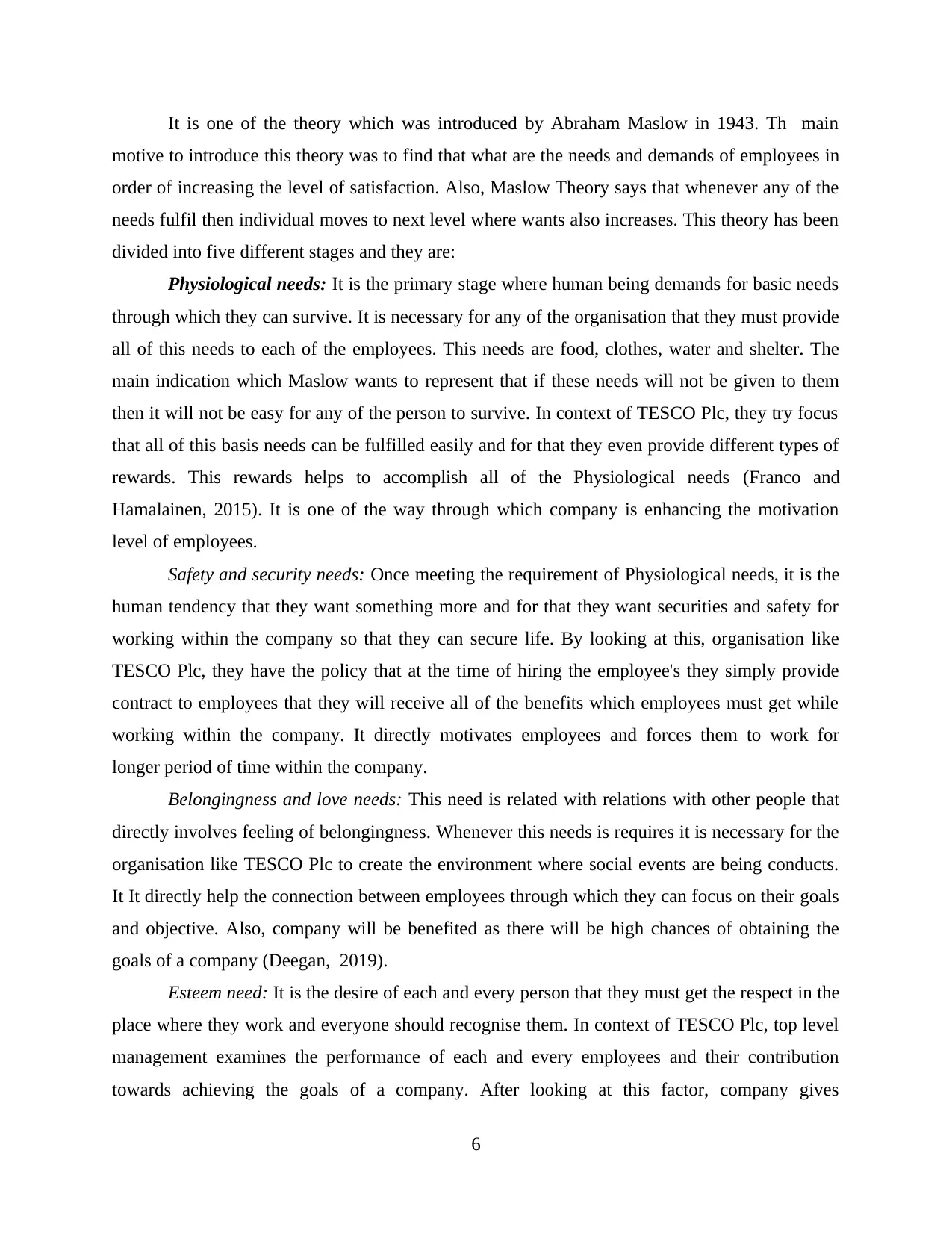
It is one of the theory which was introduced by Abraham Maslow in 1943. Th main
motive to introduce this theory was to find that what are the needs and demands of employees in
order of increasing the level of satisfaction. Also, Maslow Theory says that whenever any of the
needs fulfil then individual moves to next level where wants also increases. This theory has been
divided into five different stages and they are:
Physiological needs: It is the primary stage where human being demands for basic needs
through which they can survive. It is necessary for any of the organisation that they must provide
all of this needs to each of the employees. This needs are food, clothes, water and shelter. The
main indication which Maslow wants to represent that if these needs will not be given to them
then it will not be easy for any of the person to survive. In context of TESCO Plc, they try focus
that all of this basis needs can be fulfilled easily and for that they even provide different types of
rewards. This rewards helps to accomplish all of the Physiological needs (Franco and
Hamalainen, 2015). It is one of the way through which company is enhancing the motivation
level of employees.
Safety and security needs: Once meeting the requirement of Physiological needs, it is the
human tendency that they want something more and for that they want securities and safety for
working within the company so that they can secure life. By looking at this, organisation like
TESCO Plc, they have the policy that at the time of hiring the employee's they simply provide
contract to employees that they will receive all of the benefits which employees must get while
working within the company. It directly motivates employees and forces them to work for
longer period of time within the company.
Belongingness and love needs: This need is related with relations with other people that
directly involves feeling of belongingness. Whenever this needs is requires it is necessary for the
organisation like TESCO Plc to create the environment where social events are being conducts.
It It directly help the connection between employees through which they can focus on their goals
and objective. Also, company will be benefited as there will be high chances of obtaining the
goals of a company (Deegan, 2019).
Esteem need: It is the desire of each and every person that they must get the respect in the
place where they work and everyone should recognise them. In context of TESCO Plc, top level
management examines the performance of each and every employees and their contribution
towards achieving the goals of a company. After looking at this factor, company gives
6
motive to introduce this theory was to find that what are the needs and demands of employees in
order of increasing the level of satisfaction. Also, Maslow Theory says that whenever any of the
needs fulfil then individual moves to next level where wants also increases. This theory has been
divided into five different stages and they are:
Physiological needs: It is the primary stage where human being demands for basic needs
through which they can survive. It is necessary for any of the organisation that they must provide
all of this needs to each of the employees. This needs are food, clothes, water and shelter. The
main indication which Maslow wants to represent that if these needs will not be given to them
then it will not be easy for any of the person to survive. In context of TESCO Plc, they try focus
that all of this basis needs can be fulfilled easily and for that they even provide different types of
rewards. This rewards helps to accomplish all of the Physiological needs (Franco and
Hamalainen, 2015). It is one of the way through which company is enhancing the motivation
level of employees.
Safety and security needs: Once meeting the requirement of Physiological needs, it is the
human tendency that they want something more and for that they want securities and safety for
working within the company so that they can secure life. By looking at this, organisation like
TESCO Plc, they have the policy that at the time of hiring the employee's they simply provide
contract to employees that they will receive all of the benefits which employees must get while
working within the company. It directly motivates employees and forces them to work for
longer period of time within the company.
Belongingness and love needs: This need is related with relations with other people that
directly involves feeling of belongingness. Whenever this needs is requires it is necessary for the
organisation like TESCO Plc to create the environment where social events are being conducts.
It It directly help the connection between employees through which they can focus on their goals
and objective. Also, company will be benefited as there will be high chances of obtaining the
goals of a company (Deegan, 2019).
Esteem need: It is the desire of each and every person that they must get the respect in the
place where they work and everyone should recognise them. In context of TESCO Plc, top level
management examines the performance of each and every employees and their contribution
towards achieving the goals of a company. After looking at this factor, company gives
6
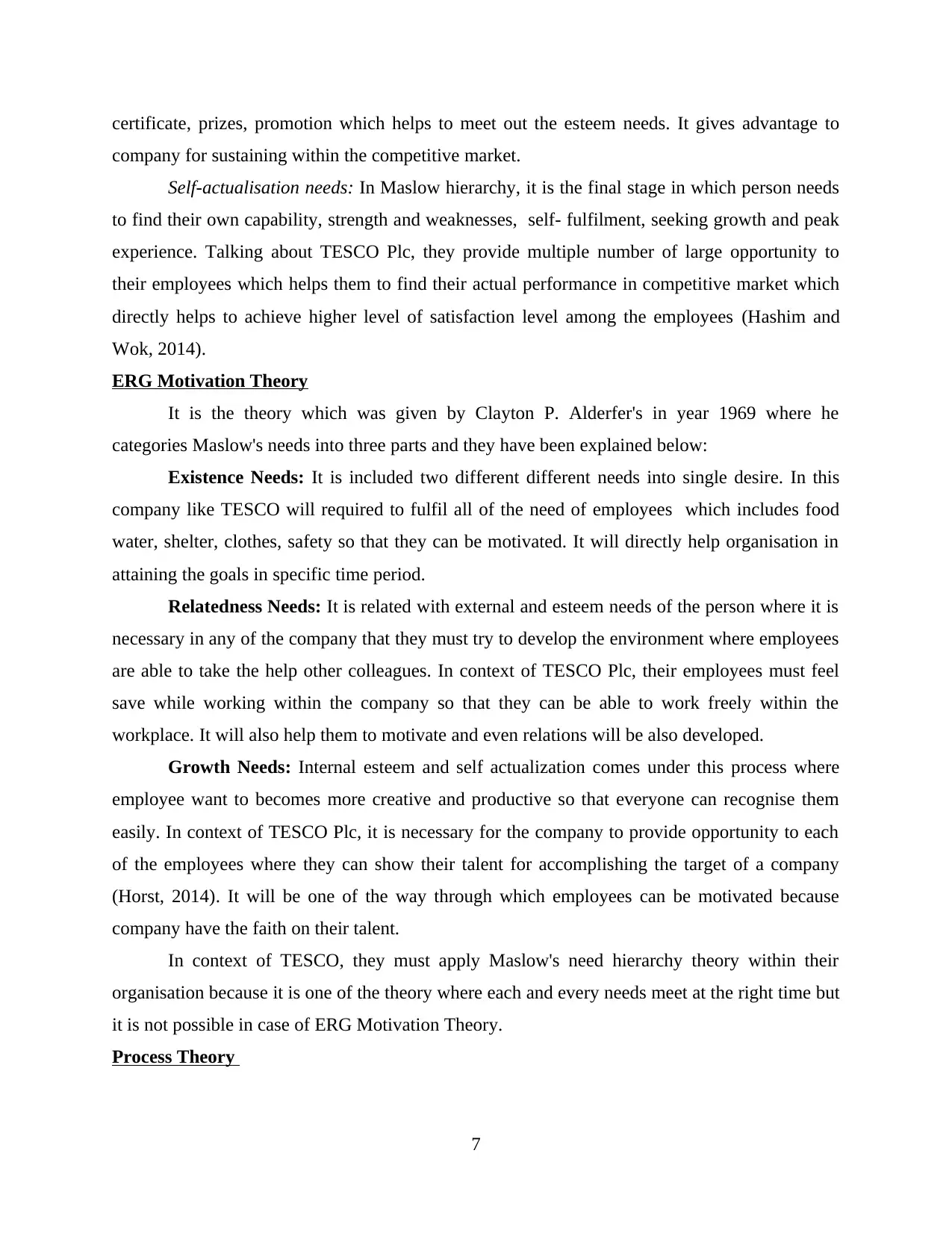
certificate, prizes, promotion which helps to meet out the esteem needs. It gives advantage to
company for sustaining within the competitive market.
Self-actualisation needs: In Maslow hierarchy, it is the final stage in which person needs
to find their own capability, strength and weaknesses, self- fulfilment, seeking growth and peak
experience. Talking about TESCO Plc, they provide multiple number of large opportunity to
their employees which helps them to find their actual performance in competitive market which
directly helps to achieve higher level of satisfaction level among the employees (Hashim and
Wok, 2014).
ERG Motivation Theory
It is the theory which was given by Clayton P. Alderfer's in year 1969 where he
categories Maslow's needs into three parts and they have been explained below:
Existence Needs: It is included two different different needs into single desire. In this
company like TESCO will required to fulfil all of the need of employees which includes food
water, shelter, clothes, safety so that they can be motivated. It will directly help organisation in
attaining the goals in specific time period.
Relatedness Needs: It is related with external and esteem needs of the person where it is
necessary in any of the company that they must try to develop the environment where employees
are able to take the help other colleagues. In context of TESCO Plc, their employees must feel
save while working within the company so that they can be able to work freely within the
workplace. It will also help them to motivate and even relations will be also developed.
Growth Needs: Internal esteem and self actualization comes under this process where
employee want to becomes more creative and productive so that everyone can recognise them
easily. In context of TESCO Plc, it is necessary for the company to provide opportunity to each
of the employees where they can show their talent for accomplishing the target of a company
(Horst, 2014). It will be one of the way through which employees can be motivated because
company have the faith on their talent.
In context of TESCO, they must apply Maslow's need hierarchy theory within their
organisation because it is one of the theory where each and every needs meet at the right time but
it is not possible in case of ERG Motivation Theory.
Process Theory
7
company for sustaining within the competitive market.
Self-actualisation needs: In Maslow hierarchy, it is the final stage in which person needs
to find their own capability, strength and weaknesses, self- fulfilment, seeking growth and peak
experience. Talking about TESCO Plc, they provide multiple number of large opportunity to
their employees which helps them to find their actual performance in competitive market which
directly helps to achieve higher level of satisfaction level among the employees (Hashim and
Wok, 2014).
ERG Motivation Theory
It is the theory which was given by Clayton P. Alderfer's in year 1969 where he
categories Maslow's needs into three parts and they have been explained below:
Existence Needs: It is included two different different needs into single desire. In this
company like TESCO will required to fulfil all of the need of employees which includes food
water, shelter, clothes, safety so that they can be motivated. It will directly help organisation in
attaining the goals in specific time period.
Relatedness Needs: It is related with external and esteem needs of the person where it is
necessary in any of the company that they must try to develop the environment where employees
are able to take the help other colleagues. In context of TESCO Plc, their employees must feel
save while working within the company so that they can be able to work freely within the
workplace. It will also help them to motivate and even relations will be also developed.
Growth Needs: Internal esteem and self actualization comes under this process where
employee want to becomes more creative and productive so that everyone can recognise them
easily. In context of TESCO Plc, it is necessary for the company to provide opportunity to each
of the employees where they can show their talent for accomplishing the target of a company
(Horst, 2014). It will be one of the way through which employees can be motivated because
company have the faith on their talent.
In context of TESCO, they must apply Maslow's need hierarchy theory within their
organisation because it is one of the theory where each and every needs meet at the right time but
it is not possible in case of ERG Motivation Theory.
Process Theory
7
⊘ This is a preview!⊘
Do you want full access?
Subscribe today to unlock all pages.

Trusted by 1+ million students worldwide
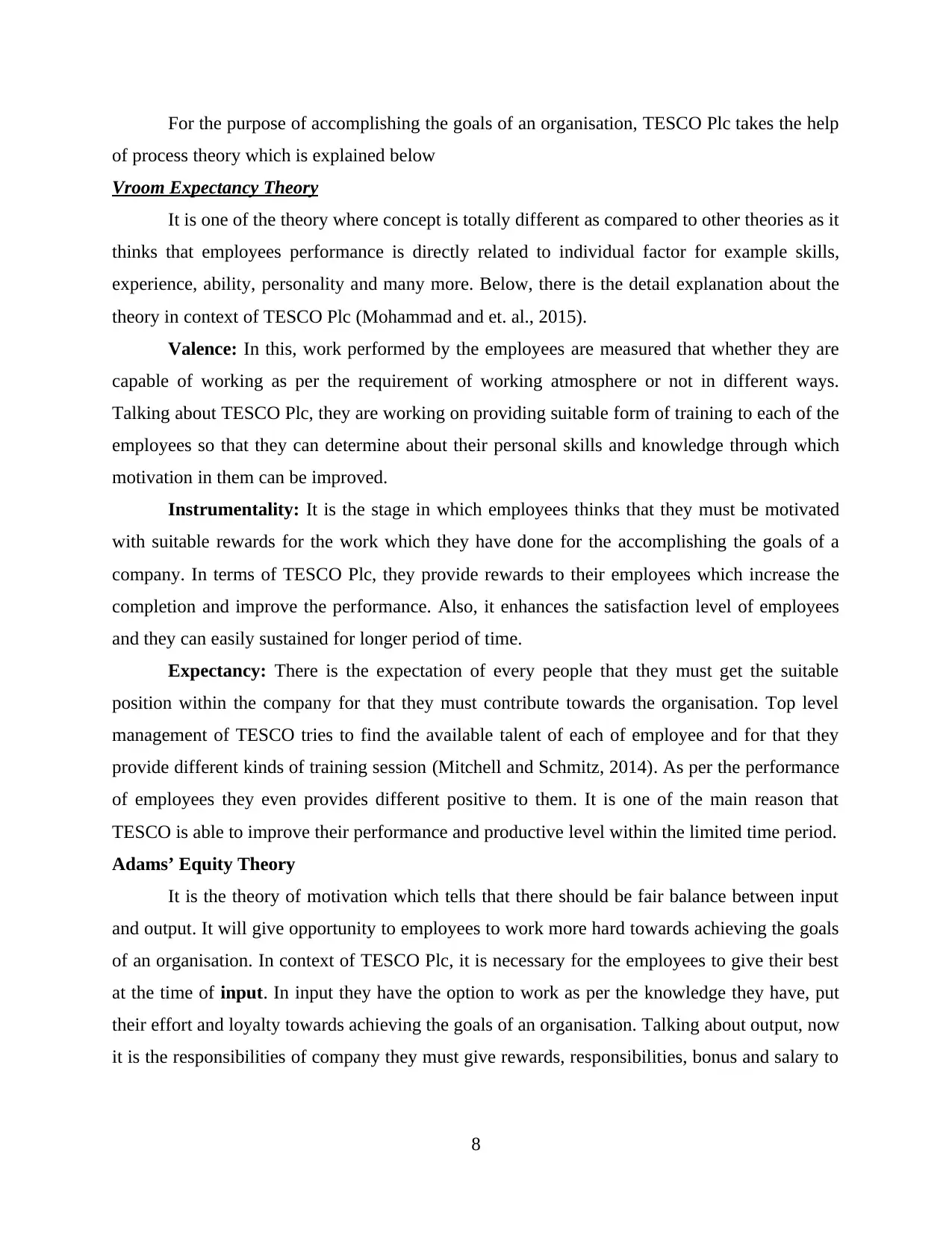
For the purpose of accomplishing the goals of an organisation, TESCO Plc takes the help
of process theory which is explained below
Vroom Expectancy Theory
It is one of the theory where concept is totally different as compared to other theories as it
thinks that employees performance is directly related to individual factor for example skills,
experience, ability, personality and many more. Below, there is the detail explanation about the
theory in context of TESCO Plc (Mohammad and et. al., 2015).
Valence: In this, work performed by the employees are measured that whether they are
capable of working as per the requirement of working atmosphere or not in different ways.
Talking about TESCO Plc, they are working on providing suitable form of training to each of the
employees so that they can determine about their personal skills and knowledge through which
motivation in them can be improved.
Instrumentality: It is the stage in which employees thinks that they must be motivated
with suitable rewards for the work which they have done for the accomplishing the goals of a
company. In terms of TESCO Plc, they provide rewards to their employees which increase the
completion and improve the performance. Also, it enhances the satisfaction level of employees
and they can easily sustained for longer period of time.
Expectancy: There is the expectation of every people that they must get the suitable
position within the company for that they must contribute towards the organisation. Top level
management of TESCO tries to find the available talent of each of employee and for that they
provide different kinds of training session (Mitchell and Schmitz, 2014). As per the performance
of employees they even provides different positive to them. It is one of the main reason that
TESCO is able to improve their performance and productive level within the limited time period.
Adams’ Equity Theory
It is the theory of motivation which tells that there should be fair balance between input
and output. It will give opportunity to employees to work more hard towards achieving the goals
of an organisation. In context of TESCO Plc, it is necessary for the employees to give their best
at the time of input. In input they have the option to work as per the knowledge they have, put
their effort and loyalty towards achieving the goals of an organisation. Talking about output, now
it is the responsibilities of company they must give rewards, responsibilities, bonus and salary to
8
of process theory which is explained below
Vroom Expectancy Theory
It is one of the theory where concept is totally different as compared to other theories as it
thinks that employees performance is directly related to individual factor for example skills,
experience, ability, personality and many more. Below, there is the detail explanation about the
theory in context of TESCO Plc (Mohammad and et. al., 2015).
Valence: In this, work performed by the employees are measured that whether they are
capable of working as per the requirement of working atmosphere or not in different ways.
Talking about TESCO Plc, they are working on providing suitable form of training to each of the
employees so that they can determine about their personal skills and knowledge through which
motivation in them can be improved.
Instrumentality: It is the stage in which employees thinks that they must be motivated
with suitable rewards for the work which they have done for the accomplishing the goals of a
company. In terms of TESCO Plc, they provide rewards to their employees which increase the
completion and improve the performance. Also, it enhances the satisfaction level of employees
and they can easily sustained for longer period of time.
Expectancy: There is the expectation of every people that they must get the suitable
position within the company for that they must contribute towards the organisation. Top level
management of TESCO tries to find the available talent of each of employee and for that they
provide different kinds of training session (Mitchell and Schmitz, 2014). As per the performance
of employees they even provides different positive to them. It is one of the main reason that
TESCO is able to improve their performance and productive level within the limited time period.
Adams’ Equity Theory
It is the theory of motivation which tells that there should be fair balance between input
and output. It will give opportunity to employees to work more hard towards achieving the goals
of an organisation. In context of TESCO Plc, it is necessary for the employees to give their best
at the time of input. In input they have the option to work as per the knowledge they have, put
their effort and loyalty towards achieving the goals of an organisation. Talking about output, now
it is the responsibilities of company they must give rewards, responsibilities, bonus and salary to
8
Paraphrase This Document
Need a fresh take? Get an instant paraphrase of this document with our AI Paraphraser
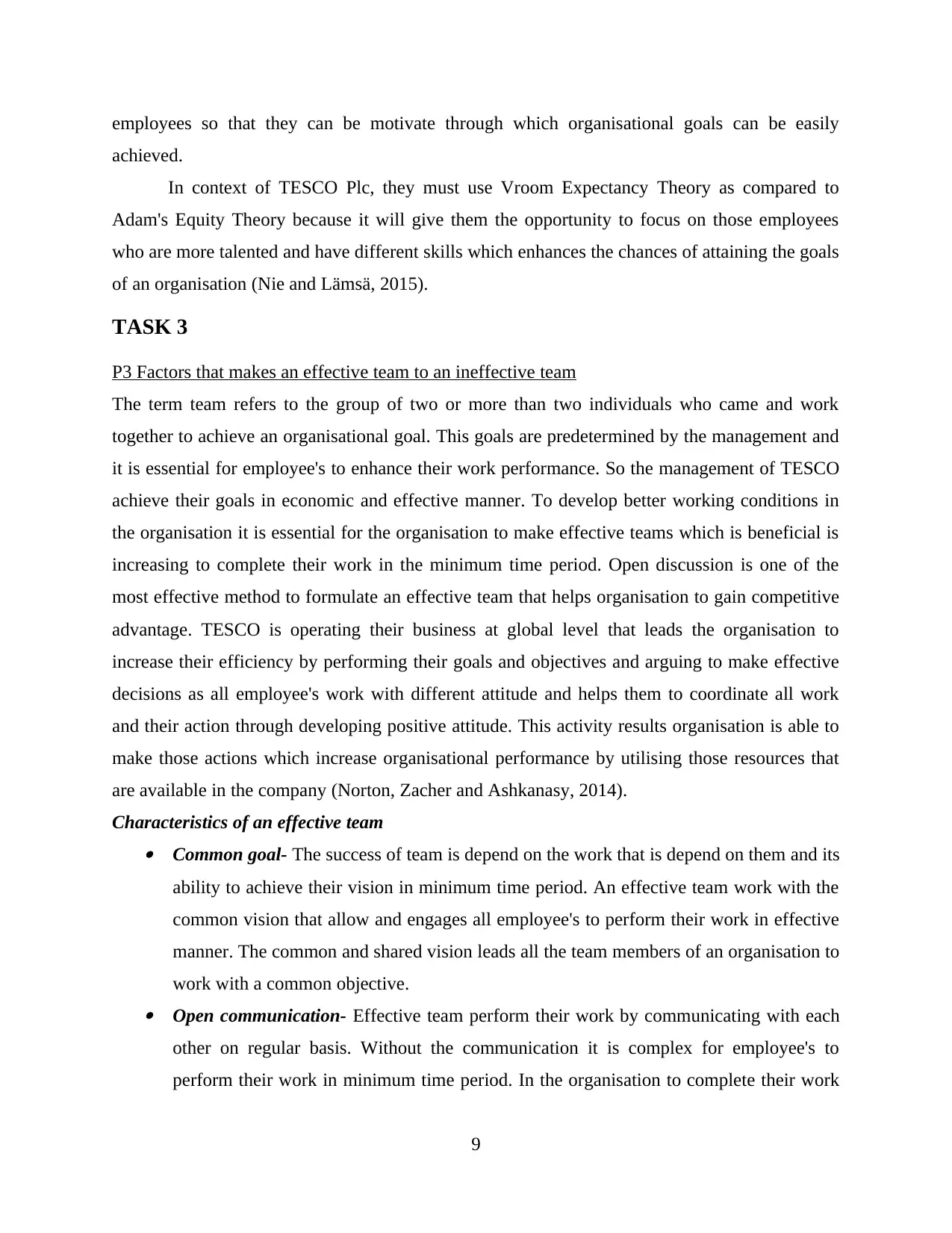
employees so that they can be motivate through which organisational goals can be easily
achieved.
In context of TESCO Plc, they must use Vroom Expectancy Theory as compared to
Adam's Equity Theory because it will give them the opportunity to focus on those employees
who are more talented and have different skills which enhances the chances of attaining the goals
of an organisation (Nie and Lämsä, 2015).
TASK 3
P3 Factors that makes an effective team to an ineffective team
The term team refers to the group of two or more than two individuals who came and work
together to achieve an organisational goal. This goals are predetermined by the management and
it is essential for employee's to enhance their work performance. So the management of TESCO
achieve their goals in economic and effective manner. To develop better working conditions in
the organisation it is essential for the organisation to make effective teams which is beneficial is
increasing to complete their work in the minimum time period. Open discussion is one of the
most effective method to formulate an effective team that helps organisation to gain competitive
advantage. TESCO is operating their business at global level that leads the organisation to
increase their efficiency by performing their goals and objectives and arguing to make effective
decisions as all employee's work with different attitude and helps them to coordinate all work
and their action through developing positive attitude. This activity results organisation is able to
make those actions which increase organisational performance by utilising those resources that
are available in the company (Norton, Zacher and Ashkanasy, 2014).
Characteristics of an effective team Common goal- The success of team is depend on the work that is depend on them and its
ability to achieve their vision in minimum time period. An effective team work with the
common vision that allow and engages all employee's to perform their work in effective
manner. The common and shared vision leads all the team members of an organisation to
work with a common objective. Open communication- Effective team perform their work by communicating with each
other on regular basis. Without the communication it is complex for employee's to
perform their work in minimum time period. In the organisation to complete their work
9
achieved.
In context of TESCO Plc, they must use Vroom Expectancy Theory as compared to
Adam's Equity Theory because it will give them the opportunity to focus on those employees
who are more talented and have different skills which enhances the chances of attaining the goals
of an organisation (Nie and Lämsä, 2015).
TASK 3
P3 Factors that makes an effective team to an ineffective team
The term team refers to the group of two or more than two individuals who came and work
together to achieve an organisational goal. This goals are predetermined by the management and
it is essential for employee's to enhance their work performance. So the management of TESCO
achieve their goals in economic and effective manner. To develop better working conditions in
the organisation it is essential for the organisation to make effective teams which is beneficial is
increasing to complete their work in the minimum time period. Open discussion is one of the
most effective method to formulate an effective team that helps organisation to gain competitive
advantage. TESCO is operating their business at global level that leads the organisation to
increase their efficiency by performing their goals and objectives and arguing to make effective
decisions as all employee's work with different attitude and helps them to coordinate all work
and their action through developing positive attitude. This activity results organisation is able to
make those actions which increase organisational performance by utilising those resources that
are available in the company (Norton, Zacher and Ashkanasy, 2014).
Characteristics of an effective team Common goal- The success of team is depend on the work that is depend on them and its
ability to achieve their vision in minimum time period. An effective team work with the
common vision that allow and engages all employee's to perform their work in effective
manner. The common and shared vision leads all the team members of an organisation to
work with a common objective. Open communication- Effective team perform their work by communicating with each
other on regular basis. Without the communication it is complex for employee's to
perform their work in minimum time period. In the organisation to complete their work
9
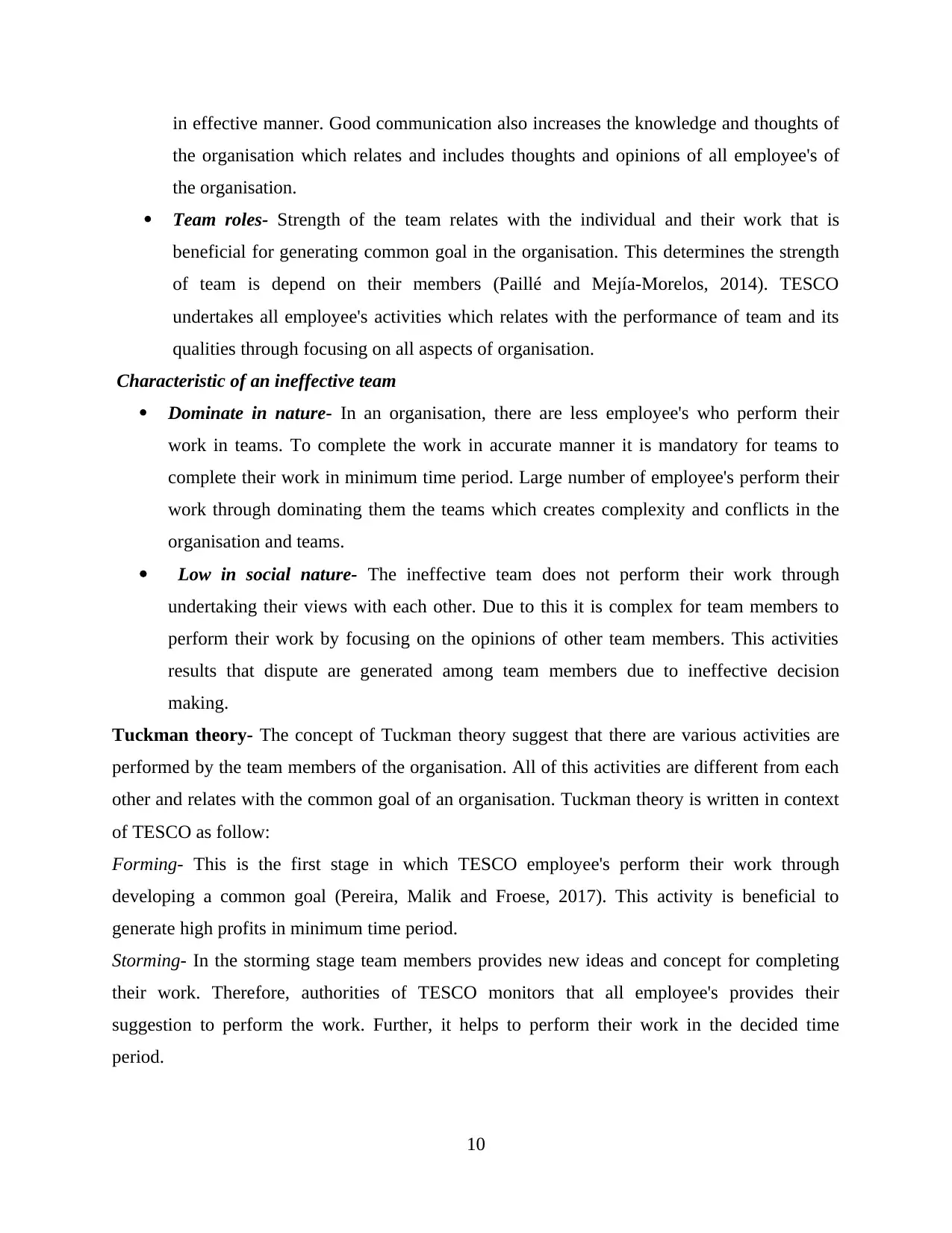
in effective manner. Good communication also increases the knowledge and thoughts of
the organisation which relates and includes thoughts and opinions of all employee's of
the organisation.
Team roles- Strength of the team relates with the individual and their work that is
beneficial for generating common goal in the organisation. This determines the strength
of team is depend on their members (Paillé and Mejía-Morelos, 2014). TESCO
undertakes all employee's activities which relates with the performance of team and its
qualities through focusing on all aspects of organisation.
Characteristic of an ineffective team
Dominate in nature- In an organisation, there are less employee's who perform their
work in teams. To complete the work in accurate manner it is mandatory for teams to
complete their work in minimum time period. Large number of employee's perform their
work through dominating them the teams which creates complexity and conflicts in the
organisation and teams.
Low in social nature- The ineffective team does not perform their work through
undertaking their views with each other. Due to this it is complex for team members to
perform their work by focusing on the opinions of other team members. This activities
results that dispute are generated among team members due to ineffective decision
making.
Tuckman theory- The concept of Tuckman theory suggest that there are various activities are
performed by the team members of the organisation. All of this activities are different from each
other and relates with the common goal of an organisation. Tuckman theory is written in context
of TESCO as follow:
Forming- This is the first stage in which TESCO employee's perform their work through
developing a common goal (Pereira, Malik and Froese, 2017). This activity is beneficial to
generate high profits in minimum time period.
Storming- In the storming stage team members provides new ideas and concept for completing
their work. Therefore, authorities of TESCO monitors that all employee's provides their
suggestion to perform the work. Further, it helps to perform their work in the decided time
period.
10
the organisation which relates and includes thoughts and opinions of all employee's of
the organisation.
Team roles- Strength of the team relates with the individual and their work that is
beneficial for generating common goal in the organisation. This determines the strength
of team is depend on their members (Paillé and Mejía-Morelos, 2014). TESCO
undertakes all employee's activities which relates with the performance of team and its
qualities through focusing on all aspects of organisation.
Characteristic of an ineffective team
Dominate in nature- In an organisation, there are less employee's who perform their
work in teams. To complete the work in accurate manner it is mandatory for teams to
complete their work in minimum time period. Large number of employee's perform their
work through dominating them the teams which creates complexity and conflicts in the
organisation and teams.
Low in social nature- The ineffective team does not perform their work through
undertaking their views with each other. Due to this it is complex for team members to
perform their work by focusing on the opinions of other team members. This activities
results that dispute are generated among team members due to ineffective decision
making.
Tuckman theory- The concept of Tuckman theory suggest that there are various activities are
performed by the team members of the organisation. All of this activities are different from each
other and relates with the common goal of an organisation. Tuckman theory is written in context
of TESCO as follow:
Forming- This is the first stage in which TESCO employee's perform their work through
developing a common goal (Pereira, Malik and Froese, 2017). This activity is beneficial to
generate high profits in minimum time period.
Storming- In the storming stage team members provides new ideas and concept for completing
their work. Therefore, authorities of TESCO monitors that all employee's provides their
suggestion to perform the work. Further, it helps to perform their work in the decided time
period.
10
⊘ This is a preview!⊘
Do you want full access?
Subscribe today to unlock all pages.

Trusted by 1+ million students worldwide
1 out of 17
Related Documents
Your All-in-One AI-Powered Toolkit for Academic Success.
+13062052269
info@desklib.com
Available 24*7 on WhatsApp / Email
![[object Object]](/_next/static/media/star-bottom.7253800d.svg)
Unlock your academic potential
Copyright © 2020–2026 A2Z Services. All Rights Reserved. Developed and managed by ZUCOL.





